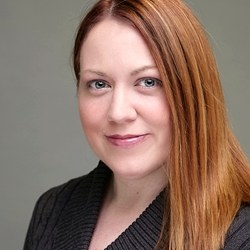Taking over the Marketing Smarts podcast from my predecessor, Matt Grant, in April 2013, was daunting at first. Matt's a very different interviewer than I am, and I knew I couldn't do the show the way he did. He encouraged me to make the podcast my own, however, and since then I've hosted more than 40 episodes. Along the way, I learned some lessons that other podcasters might find helpful.
1. An interview show isn't about the host, it's about the guests. Interjecting without having something truly worthwhile to add can disrupt the flow and cause the guest to lose her train of thought.
2. Choose guests your audience will love. We'd all like to have our friends on, but unless they're truly able to deliver content that will help your listeners, don't do it.
3. If, however, you know of people who aren't well known but have fantastic content that would help the audience, get them on and promote the heck out of them. This approach is win/win. Guests will appreciate your support, and listeners will appreciate being introduced to someone who's a helpful resource.
4. Be prepared, but don't read off a script. Conversations aren't scripted, and you want an interview to feel like a conversation.
5. People appreciate a little plucky comic relief now and then, but don't force a joke if it doesn't feel right. You'll know when it's time: It's like starting a slow clap.
6. Some people aren't funny, and that's fine. Let them be who they are.
7. Give guests a chance to promote what they're doing. I mention books and websites in the guest's introduction, but I've been surprised at how often they're working on something new that no one knows about yet. Let guests tell your audience what they've got going on!
8. Never, ever disrespect the guest or the listeners. Talking to authors, thought leaders, executives, and other smart marketers is a privilege, and I have always treated it as such. Let guests know you value them by coming to the interview on time and prepared, and let listeners know you appreciate them by delivering quality content, time and again.
9. Sometimes, there's not enough time. You want to talk to some people forever. But you can't. You owe it to listeners to work within the time frame allotted. I frequently record longer than the 30 minutes set for the podcast, but I edit it down so listeners get the best material in that half hour.
10. But you will sometimes have extra time. I interviewed the fast-talking Gary Vaynerchuk and discovered that even though I had prepared twice the usual number of topics he blew through them with time to spare. So it pays to prepare thoroughly: If you know the topic and the guest, you will be able to continue the conversation even after you run out of notes!
11. Set expectations with guests. It's fine to record episodes two months in advance if that's your how your production schedule works, but let people know that up front, or they will wonder why their episode hasn't aired.
12. Promote episodes once they go live. In my view, you should expend at least as much effort promoting the content as you did to create it. Your guests took the time to prepare for your interview and talk with you, and you took the time to research, record, and edit. All of that effort will have been wasted if no one hears the episode, so promote it across your social channels.
13. Really cool concepts require extra effort and time, and they're worth it! I created a compilation episode featuring opinions from 16 Marketing Smarts guests for 2013. It consisted of entirely new content, never heard before on the show: For six months I had asked every guest, "Which marketing tactic would you use if you could use only one?" Then, I set aside their answers and put them into a compilation file. The effort took planning, time, editing, and work, but the end result was an invaluable mix of perspectives, and one of my favorite podcast episodes to date!
14. Consider listener feedback, good and bad. I've received my share of praise as well as criticism, and I take it all in the spirit of improving the podcast. One person took exception to the way I closed interviews. They were so absorbed by the conversation that they found it jarring to hear that we were out of time! I took that to heart and changed my approach to create a gentler transition.
15. Accept that you can't please everyone. No matter how well you prepare or what your interview style is, it's impossible to make everyone like you. Realizing that I'm not everyone's cup of tea is remarkably liberating, actually. Be genuine. Be yourself. If people don't like you, they can listen to a different podcast.
16. Appreciate your audience. This theme recurs in several of the lessons I've learned, but it's important enough to repeat. Once you've found your unique voice, value the people who relate to you. Let them know that you appreciate their time and attention. Reply to comments, emails, social mentions, and shares. Without listeners, you've got no show, so show them your gratitude.
Hosting the Marketing Smarts podcast is one of my absolute favorite jobs, and I'm grateful for the chance to talk with people like Mari Smith, Mack Collier, Nancy Duarte, and David Meerman Scott. I look forward to the lessons my next 40 episodes will bring.
If you have some advice to share, please post it below or tweet me: @KerryGorgone.




